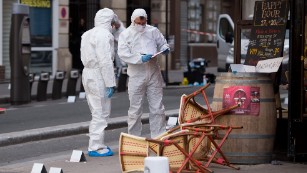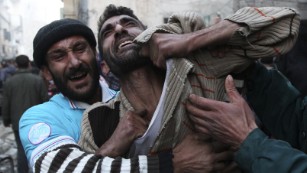Paris – The Syrian refugee crisis just got worse, due to the Paris attacks.
Now more than ever, since the Syrian war began 4½ years ago, the crisis can be summed up as damned if you do, damned if you don’t.

What made it worse? Sunday’s revelation that at least one of the Paris terrorists who killed more than 120 people on Friday entered Europe as just another face in the crowd — embedded in the current wave of Syrian war refugees. The development appears likely to fire up the security debate over what to do with them.
More than 4 million refugees have come to Europe since Syrian government forces and rebels started fighting, opening up safe havens for ISIS and pro-ISIS forces.
The immigrant wave into Europe has been reaching new highs and it shows no sign of tapering off.
One of the men who attacked Paris held an emergency passport or similar document, according to an unnamed French senator who was briefed by the French Ministry of the Interior. The senator told CNN the bomber falsely declared himself to be a Syrian named Ahmad al Muhammad, born on September 10, 1990, and was allowed to enter Greece on October 3. From there he moved to Macedonia, then Serbia and Croatia, where he registered in the Opatovac refugee camp, the lawmaker said. Eventually, he made his way to Paris, where he was one of three men who blew themselves up at the Stade de France.

Fingerprints on the passport matched those of the Stade de France bomber, the French senator told CNN.
The fingerprint was not in the French database, the senator said, and therefore officials believe the man was among a group of refugees and migrants.
The two others who detonated themselves at the stadium carried false Turkish passports, the French senator said.
“This is what we had feared,” a senior French official told the Wall Street Journal.
European officials told CNN that they believe a new professional squad of terrorists is inserting itself into some of these migrant voyages.
Pope Francis had already thought about this possibility back in September. He told a Portugese radio station, “It’s true, nowadays, territorial security conditions are not the same as they were in other periods (of mass migration). … The truth is that just 400 kilometres (250 miles) from Sicily there is an incredibly cruel terrorist group. So there is a danger of infiltration, this is true,”The Telegraph reported.
Shelter the homeless, or protect the host country?
This development will likely intensify a bitter argument. One side believes it’s important to provide shelter to thousands of helpless people who may die if they remain in Syria.
The other side believes letting in Syrian war refugees will put host countries at greater risk for terrorist attacks.
Vetting every incoming refugee would require huge resources. It likely would slow down a widening river of refugees that has already posed logistical problems in many nations. Just look how slowly the European Union is moving on its promise to relocate refugees: As of a few days ago, the EU had only relocated 147 of 160,000.
See U.N. data about the refugee crisis
But the other end of the spectrum, closing borders to Syrian war refugees could force many Syrians to remain at home — exposing them to deadly fighting between anti-government rebels and government forces. Many feel they must leave the region to save their lives.
U.N. convention on treatment of refugees
Closing borders to refugees also may violate international agreements.
The United Nations’ 1951 Refugee Convention, adopted after World War II, defines what refugees are: those who are seeking refuge from persecution. It also gives them the right to not be sent back home into harm’s way, except under extreme circumstances.
Hungary signed the U.N convention. But refugees who’ve sought refuge there have been subjected to detainment in what migrants and activists have described as dismal conditions as they await transfer. Hungary has erected a fence at its Serbian border to help control the flow of migrants.
To get around Hungary, throngs of refugees traveling through Serbia headed west to Croatia as an alternative route into Western Europe.
So far, Germany has been the most welcoming country, saying it might take in 1 million migrants by the end of the year.
The government has worked to reduce aid to asylum seekers in the country and deport more quickly those who don’t meet the official designation of political refugee.
And in spite of sympathy for refugees from the vast majority of Germans, bands of far-right protesters have shouted hate and venom at arriving refugees, throwing bottles at their buses. Dozens of empty, waiting shelters have been torched by arsonists.
Another wrinkle to this global headache: Keeping borders open to war refugees might encourage more people to take dangerous risks during their journey from Syria to Europe. Many have already drowned during attempts to cross the Mediterranean in makeshift boats.
Then there’s the deadly weather. Winter is coming. Travel will increasingly become a potentially life-threatening choice for many families.
There seem to be no simple solutions to a terribly complicated problem. And it just got a lot worse.
As reported by CNN
